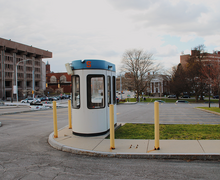Despite new paid positions, some Orientation Leaders still aren’t compensated
Courtesy of Ryan Brady
SU's Orientation Leader program added a new paid position this semester, but not all orientation leaders are paid for their work, and must work voluntarily for Welcome Week programs and new student move-in.
Get the latest Syracuse news delivered right to your inbox.
Subscribe to our newsletter here.
Syracuse University’s Orientation Leader program this semester added the role of “Student Coordinator for Leadership and Welcome Events,” which will enable some student employees in the program to be paid for their work supporting SU’s Welcome Week programs and new student move-in.
Butch Hallmark, assistant director for new student programs at SU, said responsibilities for the new student coordinator position include answering phone calls and emails directed toward the Office of New Student and Family Programs; supporting recruitment efforts and community-building events; and training for Orientation Leaders. Current OLs in unpaid positions work large-scale events like new student move-in via Goon Squad and Pre-Welcome Events.
Not all OLs will be paid and still must work voluntarily, even with the new student coordinator role available.
Clarke Johnson, who worked as a Head OL in the fall 2022 semester, described her role as a middleman between new students and families and the university. As an OL, she was responsible for issues like scheduling, staffing and addressing concerns brought up by students and parents.
“A common frustration I heard from the annual forty to fifty-person teams…was that we dealt with a multitude of issues that student leaders in other programs (in) the same office did not — without pay,” Johnson said.
Difficulties for OLs extended beyond a lack of pay, and persisted even as OLs welcomed new students during the height of the COVID-19 pandemic, Johnson said. She and other unpaid OLs would work between 14 and 18 hours a day.
Hallmark said applications for the new paid role were open to all returning OLs, but Johnson, who served as an OL for two years from fall 2020 to fall 2022, had already stepped away from the program by the time she found out about the position. Johnson said she and other former OLs were not notified of the new position, and found out about it through the few OLs who chose to return for the next academic year.
Mary Shalaby, a junior who currently works as an OL, emphasized the added burdens for some OLs resulting from their roles being unpaid. Shalaby said OLs are required to return to SU before the start of the semester, which requires students living off-campus to pay more in utilities and causes students working summer jobs to forgo potential wages.
Still, she said she finds value in the program and is willing to assume those burdens.
“While I would love to be paid because I also put in a lot of work, I hold no grudges against the new student and family office — I’m sure they would pay us if possible,” Shalaby said.
Johnson said that during her time at SU, she was met with a “look of confusion” after telling other university-employed student leaders that OLs were not paid. She later learned that other students were paid for less demanding roles.
“They couldn’t fathom doing what we did without compensation. It never hit me how hard we worked until I heard what other student leaders had to say about our work schedules,” Johnson said.
Other schools in New York state, including Ithaca College and Stony Brook University, pay student Orientation Leaders, and do not distinguish between “paid” and “unpaid” positions in their programs. Ithaca College pays OLs $14.20 an hour over a two-week period, while OLs at Stony Brook are compensated with a wage of $15 per hour.
SU does offer other paid roles for student leaders, including some within the office that runs the OL program. Hallmark referred to a non-OL position in the office for a paid intern who aids in administrative tasks and helps with overall planning Syracuse Welcome.
For both Shalaby and Johnson, despite their appreciation for the new paid position, the program, and the time and effort they’ve put into it, are worthwhile without the money.
“From my experience, every orientation leader I worked with signed on to the role to positively impact the Syracuse community,” Johnson said. “We never expected to be paid, nor did we expect any form of compensation, as we were told that it was a volunteer position. We operated purely out of good intentions and a desire to make everyone feel welcome on campus.”
Published on March 29, 2023 at 1:48 am






